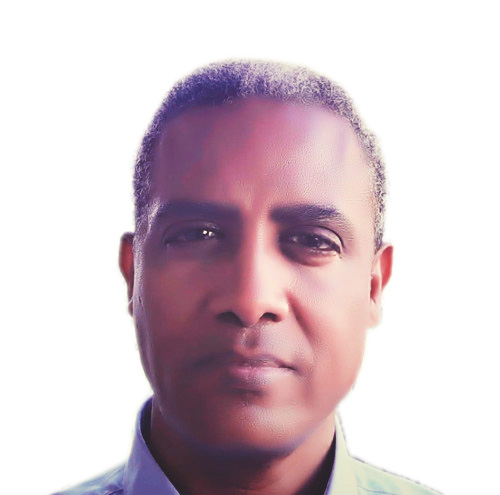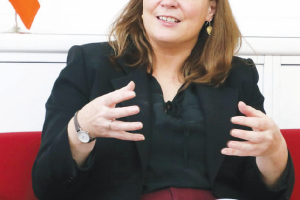
BY ZEKARIAS WOLDEMARIAM
Various issues underway here in Ethiopia are becoming hot agenda of the international community. Among these issues are Ethiopia’s effort to use its right of harnessing the Nile water by building the mega hydroelectric project, Grand Ethiopian Renaissance Dam (GERD) and the row that is unfolding between Ethiopia and the lower riparian’s, the law enforcement measure that the government launched in Tigray.
But as much as the government is trying to give correct and up to date information, there are also attempts to spread false information. In this regard many Ethiopians abroad are trying to address the misinformation efforts through their personal endeavor.
Our today guest is Denberu Mekonnen, a private business consultant who lives and works in Spain for 30 years. Denberu has published first tour guide about Ethiopia in Spanish which can be taken an eye opener about Ethiopia for the Spanish speaking world. The Ethiopian Herald had made a brief stay with him to know about his experience and efforts to promote the image and interest of his country in Spain and Spanish speaking world. Excerpt:
As an Ethiopian who has lived in Spain for many years how do you promote the image of your country?
If we focus, for example, on cultural and economic aspects: Culturally, in what is now Spain, three cultures coexisted for centuries with three different ways of understanding the world and living in it: Christian, Muslim and Jewish.
Therefore, Spain is one of the culturally rich countries. As a consequence, among other things, Spain is one of the three most visited countries in the world. Before the COVID, for example in 2019, more than 82 million tourists visited Spain, double its population (46 million).
Economically, Spain is the fourth largest economy in the European Union after Germany, France and Italy. It is an ideal country for the international expansion of companies. It ranks 13th in the world in receiving investments.
More than 14,600 foreign companies have chosen Spain to establish themselves. Of the 100 largest companies in the Forbes Global 2000, 70 are in Spain. On the other hand, the Spanish health system is among the best on the planet.
How did you happen to live in Spain? Mostly Ethiopians travel and live in Untie States, Canada, UK? How did you get to stumble in Spain?
Before coming to Spain, I had lived in Cuba, because it was one of those children whose parents had died in the wars with Somalia and who went to Cuba with a scholarship. When I returned from Cuba, as I spoke Spanish, I applied for a scholarship at the Spanish Embassy in Addis Ababa to go to study in Spain.
In Spain I studied a Degree in Political Science and Sociology (specialization in International Relations) and a Diploma in Labor Relations. Finally, I married a Spanish woman and started a family in Barcelona. I have been in Spain for more than 30 years.
How is your life, work in Spain? Are there also other Ethiopians there? How is their life?
For many years I have worked in private and public companies in different sectors and I have also been a professor of African history and Amharic at a Spanish university in Barcelona. Currently, I am the founder and consultant of Mekonnen & Brook Business Consulting.
From my consultancy we offer services to Spanish companies to start or expand their businesses in Ethiopia, Kenya and Eritrea and at the same time, we offer Ethiopian companies (also from Kenya and Eritrea) services focused on taking advantage of the Spanish and Portuguese market. However, most of our activity is concentrated in Ethiopia and Spain, because the demand from companies on both continents is directed to these countries.
Regarding the number of Ethiopians who live in Spain, we are relatively very few, about 600. The majority lives and work in Madrid, Barcelona and Valencia. Among those I know, they have diverse dedications and are perfectly integrated into Spanish society, which is generally welcoming.
How are Ethiopia and Ethiopians known in Spain and Spanish speaking countries?
Ethiopia is one of the most unknown countries in Spanish-speaking countries. I take advantage of this occasion to recall modestly that Ethiopia must adopt an active state policy to promote country’s image abroad in the world by promoting its culture, history, achievements, lifestyle and diversity.
This state policy to opening the country to the world must be continuous and long-term and it would be developed by a government institution created ad-hoc that is coordinated with the embassies, companies, the media, Ethiopian abroad, etc. Better and positive country ‘s image abroad serves to attract a greater number of productive investments,
empowers Ethiopian exporters companies; attract a greater number of tourists to Ethiopia; as well as having a greater presence in the different international decision-making forums.
What about the knowledge and awareness of Ethiopians about Spain and Portugal? How much have we benefitted from the economic, trade potentials there?
There are clear opportunities in the Spanish market, by extension Portuguese, but the benefit of Ethiopian companies is scarce. They are generally limited to the export of raw materials and the import of manufactured products concentrated in some sectors.
Therefore, Ethiopian companies have to open up more to take advantage of all the possibilities offered by the Portuguese market and especially the Spanish one. In this sense, I wish to point out that the relationship of Ethiopian
companies with those of economically developed countries should not be limited to the export of raw materials and the import of manufactured products partly made from their own raw materials. Ethiopian companies have to seek a strategic business partnership with companies from economically developed countries to obtain a transfer of knowledge how or technology that serves to add value to their products or services.
In this way, for example, instead of just exporting the coffee bean, it could create a large industry in the country destined to roasting, packaging and marketing it as a finished product Made in Ethiopia. For example, coffee is a big business that moves about $ 71 billion annually.
But the coffee bean exporting countries only take 10% and the rest, 90%, remains in the hands of the countries that do not even grow coffee, they are the ones that process and sell. So what do producing countries have to do if they want to get a bigger share of the profits generated by the juicy coffee business? These, in addition to modernizing their cultivation methods, also have to deal with processing and packaging, which is, on the other hand, where the benefits really lie.
As a Business and investment consultant what do you advise Ethiopians and investors to benefit from the potential of opportunities in Spain?
I modestly suggest among other things, the following Ethiopian companies that export raw materials or import manufactured products should diversify their suppliers and customers by opening the market. In this way, they acquire independence of choice and minimize the risks of a single customer or supplier.
Ethiopian companies must have a good understanding of the culture and economic mindset of Western companies. Above all, they must great attention should be paid to formalities(seriousness), such as answering emails and returning phone calls in due time, preparing a good description of the product to be exported, offering good quality images of the products to be exported; take time and effort to learn about the dynamics of the Spanish market, by extension, western market.
In the latter case, for example, there are Ethiopian businessmen who make a business trip to Spain during the traditionally the month for holidays(August)or who make a business trip (10h and hotel-restaurant expenses), only to visit a factory instead of taking the opportunity to also see other suppliers or potential clients and thus make the travel expenses profitable.Ethiopian importing companies have to pay close attention to those products called “private label product” (generic products).
These product line are much cheaper but of the same quality as the first-line brands due, among other things, to lower promotional costs.
In Europe, a good part of the middle class consumes these products, therefore, they are valid for Ethiopia.-Ethiopian importing companies should not resign themselves to exporting only raw materials; they must strive to process them. To overcome the lack of capital, technology and know-how to processing they should explore cooperation strategies with Spanish
companies, by extension companies. For example, Spain is one of the tourist countries par excellence. As I have said, in 2019 more than 82 million tourists visited Spain. Therefore, the European country perfectly managed the stay and needs of these millions of tourists along with its population of 46 million.
Therefore, Ethiopian tourism companies and institutions, in addition to trying to attract Spanish tourists to Ethiopia, must work on how they can learn from Spain about international tourism promotion abroad, management of tourism resources, infrastructure development, quality tourism professional training, and use of technology in the hospitality and tourism industry, coordination of the different agents involved in the tourism sector.
In this way, in the long term, Ethiopia will attract more tourists. For this, among other things, the Ethiopian tourism companies the need to look for how to work with professionals, companies, associations and institutions of the Spanish tourism sector.
For example, association of tourism professionals, catering companies, hotels, intermediation (Tour Operators), rentals, cultural and leisure activities, educational (tourism schools, language schools …), etc.
What have you done so far to motivate Spanish investors to explore opportunities in Ethiopia?
I personally wrote the first cultural, travel and tourism guide on Ethiopia in Spanish (we are already in the third edition). This guide fit very well the preferences of Spanish travelers and tourists because I have brought Ethiopia closer to them from an Ethiopian and Spanish mentality.
On the other hand, at Mekonnen & Brook Business Consulting we work continuously promoting Ethiopian products in the Spanish market; connecting Spanish companies in contact with Ethiopians, presenting business opportunities in Ethiopia for Spanish companies and promoting the advantages of investing in Ethiopia before Spanish entrepreneurs. However, following our philosophy, in our actions we give preference to alliances and cooperation, based on win win, between Ethiopian and Spanish companies. Likewise, the search for the best Spanish professionals from various sectors, above all, aimed at transferring know-how to Ethiopian companies.
In one of your articles you have mentioned that the issue of Nile is a matter of justice. Can you elaborate on that?
As I said in my article “A historical injustice: the misappropriation of the waters of the Nile”, the Great Renaissance Dam (GERD-)is an economic development project, however, it is above all a question of justice. Ethiopia, like any state in the world, has the full right to exploit and manage all the natural resources on its land.
That the Blue Nile is born and flows through Ethiopian territory is a fact since time immemorial, since before the constitution of Ancient Egypt and, of course, since before the arrival of the vast majority of current Egyptians to Egypt from the century VII. Therefore, no state could veto another
state the use of its natural resources for the benefit of its population. Egypt, which does not contribute a drop to the water of the Nile, built the Aswan Dam to provide a greater volume of irrigation water; expand the map of arable land and plant more crops; store water for periods of drought; guarantee the supply of drinking water to the population; produce hydroelectric power; irrigate hundreds of thousands of hectares of desert land, transfer water from the Nile to the arid Sinai peninsula in Asia.
Therefore, Ethiopia, which contributes 86 per cent of the river flow, if it is banned to take advantage of the waters of the Blue Nile (Abay), this has a clear name: Injustice.
Metaphorically speaking it is as if a person were denied to use his or her own money saved in the bank, because if it withdraws part of their savings it would damage the capital of the bank. Injustices must be corrected without excuses.
Ethiopia Currently undergoing political reform. In connection with that it is facing conflicts, disaster, etc. This is grabbing the attention of many media. How much do you think is the reality reflected?
Generally, Spanish mass media dedicate little to the Ethiopia, by extension of Africa, very little is said in the Spanish media. They mainly focus on Europe, America, Asia and Middle East.
Currently, on the few occasions that they have cover about Ethiopia, the predominant themes are the Grand Ethiopian Renaissance Dam and the opposition of Sudan-Egypt and the conflict in Tigray. Their chronicles and news are supported by different sources; therefore, they offer versions for all tastes.
As an Ethiopian who has lived abroad for long, what would you like to say about Ethiopian diaspora who intend to return home?
It all depends on the circumstances of each Ethiopian who returns to his country: marital status, whether he is married to an Ethiopian or foreign person, whether he has children or not, whether he is young or not, whether he suffers from a treatable disease in Ethiopia or not. If you have enough savings or professions to start a new life in Ethiopia, etc.
Therefore, there are many variables that must be taken into account when returning to the native country. For example, if you are a person who has been out of the country for many years when it comes time to return, you will have to go through a small re-adaptation process in all senses.
I would like to emphasize that many countries have permanent Economic and Trade Offices that support their national companies in taking advantage of market opportunities in different countries. In Portugal and Spain there is no Ethiopian Economic and Commercial Office. Therefore, from my consultancy Mekonnen & Brook Business Consulting we cover this lack by supporting Ethiopian companies to take full advantage of the opportunities offered by the Portuguese and very especially Spanish markets. For further information please visit our website.
The Ethiopian Herald February 27/2021




